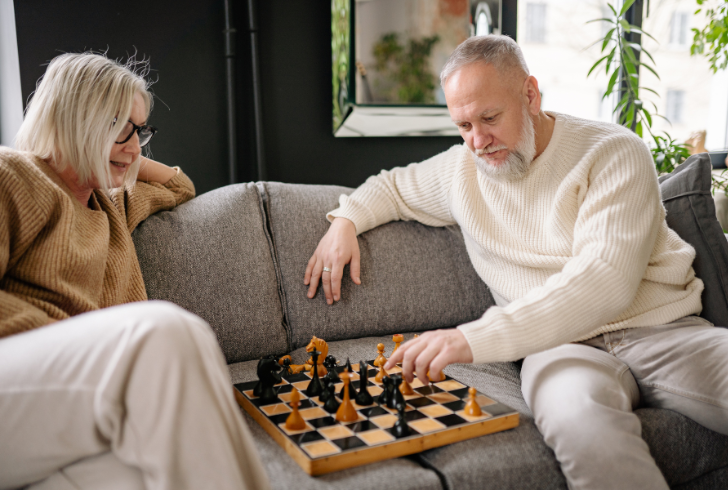Retirement often brings visions of leisure and relaxation. Yet, new research suggests those golden years should include more than just rest. A study published in the American Journal of Geriatric Psychiatry highlights that having a strong sense of purpose in life may reduce the risk of dementia by nearly one-third.
Researchers found that people with higher purpose were 28% less likely to develop cognitive decline, including dementia. While dementia is complex and influenced by many factors, this finding strengthens evidence that lifestyle choices play a major role in brain health.
What the Study Revealed

Freepik | Yan Krukau | Older adults stay mentally sharp and lower dementia risk by engaging in purposeful activities like chess.
Scientists tracked more than 13,000 adults aged 45 and older for up to 15 years. Participants completed regular cognitive tests and shared information about their daily lives and well-being.
The results were striking. Those with greater purpose showed significantly lower odds of developing cognitive impairment. This connection held strong even when considering factors such as education level, depression, or genetic risk like the APOE4 gene linked to Alzheimer’s.
Dr. Aliza Wingo, senior study author and professor at UC Davis, called the findings encouraging: “Purpose in life acts as a robust protective factor against dementia.”
Why Purpose Matters for the Brain
Although the study did not pinpoint exactly why purpose protects cognition, experts suggest several explanations.
Dr. Clifford Segil, neurologist at Providence Saint John’s Health Center, explained that purposeful living usually involves mentally stimulating activities. Setting goals, learning new skills, and planning for the future all keep the brain active.
He noted, “When people feel they have no direction, they can become stagnant, which is unhealthy for the brain.”
Social connections also play a role. People with purpose often spend more time with others, volunteer, or care for loved ones. Dr. Wingo added that this helps prevent loneliness, a factor linked to a 30% increase in dementia risk.
Activities That Foster Purpose
Purpose does not look the same for everyone, but several activities consistently strengthen it. Experts recommend:
1. Building strong relationships - Caring for family, supporting friends, or spending time with grandchildren.
2. Volunteering or working - Staying engaged in community causes or professional roles.
3. Practicing faith or spirituality - Joining religious groups or participating in spiritual traditions.
4. Pursuing hobbies and goals - Learning instruments, gardening, or setting personal milestones.
5. Helping others - Acts of kindness and philanthropy that create fulfillment.
Dr. Wingo emphasized that the type of activity matters less than the meaning attached to it. The key is consistency and genuine engagement.
When to Start Building Purpose

Freepik | wirestock | Living a healthy and active life with purpose helps support the brain and lower dementia risk.
The research included adults starting in their mid-40s, but experts suggest it’s never too early—or too late—to develop a sense of direction. Dr. Wingo explained that adopting purposeful habits in the early 50s may provide the greatest benefit, since this is when dementia risk begins to rise.
Still, Dr. Segil stressed that people of any age can benefit. “It’s never too late to find a new purpose or continue working toward long-term goals,” he said. Even starting something fresh later in life, like painting or mentoring, can provide mental stimulation and social connection.
Building a Healthier Future
Dementia is a complex condition influenced by genetics, age, diet, and overall health. No single lifestyle habit can completely prevent it, but research shows that daily choices accumulate to impact long-term brain health.
Balanced nutrition, regular physical activity, and heart health are proven strategies. Adding a sense of purpose offers another meaningful way to support cognitive function. Purposeful living encourages learning, social interaction, and engagement in activities—all of which strengthen mental resilience.
Whether through caring for loved ones, volunteering, or setting personal goals, these purposeful actions can safeguard memory and clarity. While they may not guarantee full protection from dementia, they significantly improve the odds, adding both years to life and life to years.

